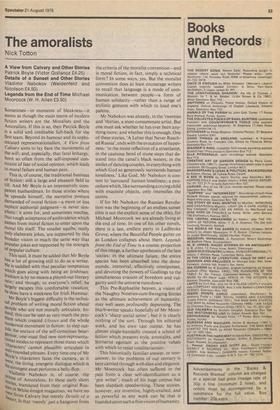The amoralists
Nick Totton
A View from Calvary and Other Stories Patrick Boyle (Victor Gollancz £4.25) Details of a Sunset and Other Stories Vladimir Nabokov (Weidenfeld and Nicolson £4.50) Legends from the End of Time Michael Moorcock (W. H. Allen £3.50)
Sometimes—in moments of bleakness—it seems as though the main teams of modern fiction writers are the Moralists and the Amoralists. If this is so, then Patrick Boyle is a solid and creditable full-back for the first team. Beyond its humour and its sophisticated representationalism, A View from Calvary aims to lay bare the movements of the will; and, especially, that fatal lethargy, born so often from the self-imposed constraint of fear of social opinion, which leads to moral failure and human pain.
This is, of course, the traditional business of fiction: still a large and pleasant field to till. And Mr Boyle is an impressively comPetent husbandman. In those stories where he spreads himself, the narrative posture demanded of moral fiction—a more or less explicit authorial judgment—is never simPlistic: it aims for, and sometimes reaches, that tough acceptance of ambivalence which Passes from moral fiction to enter upon the moral life itself. The smaller squibs, really Only elaborate jokes, are supported by this broader vision in much the same way that Popular jokes are supported by the strength °f Popular culture.
This said, it must be added that Mr Boyle has a lot of growing still to do as a writer. }le is saddled with that peculiar temptation Which goes along with being an Irishman. kishism is by no means a played-out literary ivelo; and though, to everyone's relief, he 'LargelY escapes this comfortable vocation, ne does have a weakness for Irish Humour.
Mr Boyle's biggest difficulty is the technical problem of writing moral fiction about ,Pe°Ple who are not morally articulate. Inred, this can be seen as very much the pro"lent which created Ulysses and the whole th.odernist movement in fiction: to step outside the enclave of the self-conscious bourta.eoisie, one must find new non-representa,1°nal modes to represent those states which .eharacters' cannot plausibly articulate in v'll'tell-rounded phrases. Every time one of Mr weYle's characters faces the camera, as it k.cre. the living, energetic dialogue which is 'as strongest asset performs a belly-flop. Dr Vladimir Nabokov is, of course, the it, sto—,ce of Amoralists. In these early short sial'es, translated from their original Rus viewu in White émigré magazines, we have no , s from Calvary but merely Details (),I a 14 at 'merely' h t merely' just a hangover from
the criteria of the moralist convention--and is moral fiction, in fact, simply a technical form? In some ways, yes. But the moralist convention does at least encourage writers to recall that language is a mode of communication between people--a form of human solidarity—rather than a range of stylistic gestures with which to load one's palette.
Mr Nabokov was already, in the 'twenties and 'thirties, a most consummate artist. But one must ask whether he has ever been anything more; and whether this is enough. One of these stories, 'A Letter that Never Reached Russia'. ends with the evocation of happiness: 'in the moist reflection of a streetlamp, in the cautious bend of stone steps that descend into the canal's black waters, in the smiles of dancing couples, in everything with which God so generously surrounds human loneliness.' Like God, Mr Nabokov is content to 'surround' human loneliness; a procedure which, like surrounding a crying child with exquisite ,objects, only intensifies the centre.
If for Mr Nabokov the Russian Revolution was the beginning of an endless sunset (this is not the explicit sense of the title), for Michael Moorcock we are already living at the end of time. In one of his other novels, there is a last, endless party in Ladbroke Grove, where the Beautiful People gutter on as London collapses about them. Legends from the End of Time is a cosmic projection of this image, a further apotheosis of the late 'sixties: in the ultimate future, the entire species has been absorbed into the demimonde, immortal, effectively omnipotefit, and devoting the powers of Godlings to the simultaneous evasion of boredom and vulgarity until the universe runs down.
This Pre-Raphaelite heaven, a vision of the Naughty Nineties-cum-Swinging Sixties as the ultimate achievement of humanity, may well seem profoundly depressing. The blurb-writer speaks hopefully of Mr Moorcock's 'sharp social satire'; but it is clearly nothing of the sort. Through his editorial work, and his own vast output, he has almost single-handedly created a school of fiction which presents style, amorality, and Stirnerist egotism as the positive values with which to resist totalitarianism.
This historically familiar answer, or nonanswer, to the problems of our century is here carried through with elan and elegance. Mr Moorcock has often suffered in the past from a clear self-identification as a 'pro writer': much of his huge corpus has been slapdash speedwriting. These stories, however, are inventive, highly-crafted, and as powerful as any work can be that is founded upon such a thin vision of humanity.


































 Previous page
Previous page